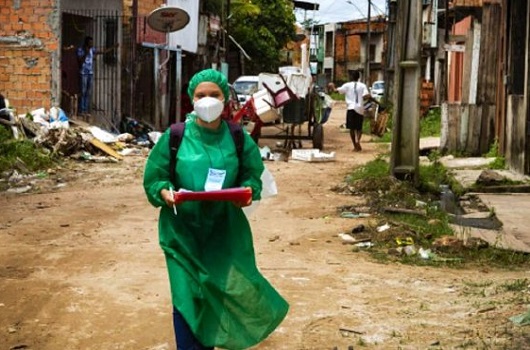The Lancet: Socioeconomic impact of COVID-19 is more significant and will be longer-lasting in vulnerable populations
14/12/2021
Sustainable Amazon Foundation
A research published today by The Lancet - one of the most prestigious scientific journals focused on the medical field in the world - brought together experts to explain how the economic downturn will affect for years and will be worse in developing countries. Without a consensus for preventive action, families and communities will be disproportionately affected. In the long run, inequalities in health, physical and socioeconomic well-being will widen worldwide. Fiocruz president, Nísia Trindade Lima, is one of the authors.
Image: Nailana Thiely/ Ascom Uepa
These vulnerable populations are often invisible to governments, resulting in insufficient access to public services and economic equity programs. In addition, official data on health indicators, whether linked to COVID-19, are not publicly available in several countries. Hence, the accurate dimension of gravity is underestimated. There is an urgent need for
more disaggregated and standardized data that accurately inform public actions and policies.
One of the research authors is the general superintendent of the Sustainable Amazon Foundation (FAS), professor Virgilio Viana, PhD from Harvard, member of the Vatican's Pontifical Academy of Social Sciences and associate professor at Fundação Dom Cabral. He mentioned the challenges that indigenous and riverine communities face in the Brazilian part of the Amazon rainforest because of COVID-19:
"This article highlights in an obvious way the importance that science gives to the need to have a differentiated treatment for the most vulnerable populations. Concerning Amazon, the attention to health issues in indigenous areas and traditional populations of the deep Amazon deserves special attention, as we can see with the virus's arrival in communities. Therefore, this scientific production points to the need to think about the SUS in the forest to increase its efficiency and effectiveness, based on the experience with our work at FAS, which helped many communities and provided support during the most difficult period of the pandemic, especially in Amazonas."
There is a specific need for up-to-date data collection to understand the effect of COVID-19, specifically on people living in vulnerable conditions. For example, the number of hospitalizations, deaths, and other social and health well-being indicators need to be broken down by gender, age, race, ethnicity, disabilities, and other variables.
Nísia Trindade Lima, president of the Oswaldo Cruz Foundation, explains that these data can help create public policies: "The pandemic forces us to regain a perspective on how social protection and universal health care coverage have been neglected in the last decade. The population effects of environmental and social phenomena are felt worldwide, mainly by people in vulnerable situations. It is no longer possible to face inequality as if it were not everyone's problem," she said.
Who is affected?
When we talk about populations living in vulnerable situations, we include individuals who face systematic exclusion and discrimination because of factors such as age, disability, race,
ethnicity, gender, economic class, religion, creed or belief, gender identity, sexual orientation and migratory situation, in addition to those who are in conflict and stateless. Furthermore,
people who are incarcerated, with chronic health conditions (e.g., mental disabilities), living in inadequate housing and exposed to environmental degradation, air pollution and at risk
from climate change are also affected.
At the end of the article, the authors highlight five recommendations to help protect vulnerable populations and reduce health inequalities. The first one refers to the importance of implementing universal health coverage and implementing social protection systems in countries; the second concerns the commitment of governments and parliaments to finance
and safeguard social and health services; as a third recommendation. There is a need for digital equity for all; in the fourth indication, the emphasis is on the economics of care; and,
finally, the fifth recommendation highlights the revitalization of relations between governments and civil society actors to ensure that communities, vulnerable populations and
all gender identities have a central role in decision-making.
The study concluded that the world had reached a crucial moment, demanding more than ever a collaborative response to expanding universal access to health and social protection. It is necessary to build strategies and public policies that consider more resilient health and social care systems, including those experiencing a humanitarian crisis, to mitigate the effects of the pandemic, address inequality and improve the resilience of vulnerable communities.





